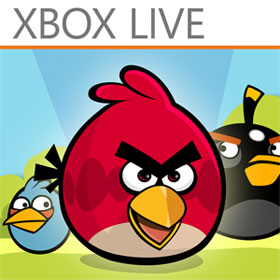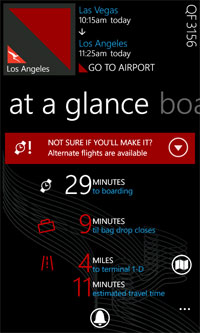LAS VEGAS — April 13, 2011 — On the heels of its recently announced Nokia partnership, and a range of improvements to its Windows Phone platform and developer toolkit, Microsoft rode into Las Vegas for MIX11 this week on a wave of Windows Phone momentum. The company’s corporate vice president of Mobile, Joe Belfiore, took to the keynote stage with a compelling message for developers: Now is the time to create the next-generation apps and games for Windows Phone.
Microsoft said it remains on track to start delivering the next version of Windows Phone to new and existing devices by the end of this year. Windows Phone Developer Tools will be available in May, and Microsoft announced that new features will enable the following:
-
Live Agents create superior customer engagement with real-time interactions via Live Tiles, Push Notifications, Deep Linking and Background Agents. Multitasking is also enhanced to allow for fast applications switching, as well as background audio and file transfer.
-
Phone integration has been greatly improved for developers wanting to do more with their apps. The Live Tiles functionality has been expanded to give developers more flexibility and engage with their customers better.
-
Developers will have access to the Motion Sensor library and the camera, enabling augmented reality experiences. The integration extends deeper into the operating system via sockets and database access now available to apps and games.
Getting Apps to Market
Providing developers with the tools they need to bring their creativity to life is all well and good. However, Microsoft has also put a considerable amount of thought into creating a path to the marketplace for developers.
Part of broadening app exposure involves opening the global market further. Brandon Watson, senior director of developer experience for Window Phone 7, noted that since the launch of Windows Phone in November, the number of countries that support creation and commerce of apps has jumped from 16 to 35. He also said that three additional countries — most notably China — will soon support app creation..

Using logic, skill and force, users must seek revenge on the green pigs who stole the birds’ eggs – putting the survival of angry birds at stake. Angry Birds features hours of gameplay and 195 levels. Coming to Windows Phone Marketplace on May 25, 2011.
Expanded opportunities through Windows Phone Marketplace include:
-
More countries – 35 countries with creation and commerce, up from 16 with the first version of Windows Phone
-
Expanded reach – dedicated games Marketplace, parental controls and new beta distribution service
-
Improved discoverability – exposure through Bing Search “extras,” expanded search functionality and new merchandising opportunities
-
Additional monetization opportunities – more mobile operator billing, expanded country support for advertising SDK
-
Streamlined processes – App Hub application submission, update, management and reporting capabilities
“We’re doubling the number of countries that support creation and commerce, and we’re creating parity to the countries that only supported creation before and didn’t have the ability to sell their apps,” Watson said. “From an opportunity standpoint, that’s huge.”
Kik Interactive and Windows Phone 7
One recent convert to the Windows Phone platform is Kik Interactive — the Ontario-based startup responsible for Kik Messenger.
Kik began by developing for Android, iPhone and Blackberry only. However, when the company stopped developing for Blackberry earlier this year, it decided to take a good, hard look at the Windows Phone 7 platform. It didn’t take long for Kik to see the light.
“Our developers fell in love with it almost immediately,” said Ted Livingston, CEO of Kik Interactive. “We had been doing Android and iPhone for over a year. Within one month, we’d developed our first app for Windows Phone 7.”
Livingston said that Kik’s decision to build for Windows Phone did not come easily. For Kik, and developers in general, building apps and games for a new platform is a major commitment of time and resources.
This, coupled with the fact that Windows Phone had a customer base of zero just months ago, means developers could be less likely to invest the time and energy required to build on a new platform.
Microsoft’s Watson acknowledges the current environment from a developer’s perspective.
“We’re not the first choice for many developers right now — we know that,” Watson said. “But developers have nothing but opportunity in front of them in the mobile space. So we’re doing everything we can to give them the best tools.”
Livingston said that he and his developers at Kik are reluctant to build on any new platform. However, after trying the Windows Phone Developer Tools, and seeing how easy they are to use, it was clear the real risk for his young company would be not to build an app for Windows Phone.
“After using the tool set, and knowing about the partnership between Microsoft and Nokia, it would be crazy for us not to develop for Windows Phone,” Livingston said. “We want to be ready to ride the wave before the wave happens.”
Kik’s new app is just one of the next-generation Windows Phone apps announced today at MIX11. Other new apps and games include Skype, Australia-based airline Qantas, the game “Plants vs. Zombies,” and the augmented reality app Layar. Microsoft also announced that the wildly popular game “Angry Birds” will be available at the Windows Phone Marketplace beginning on May 25, 2011.

Qantas for Windows Phone allows users to manage travel plans including checking in and reviewing the status of an upcoming flight. Coming soon to Windows Phone Marketplace.
Building a Mobile Ecosystem
A key piece to Microsoft’s strategy in the mobile ecosystem is establishing long-term relationships with developers to ensure that this community plays a key role in shaping what’s next in mobile.
According to Matt Bencke, general manager of developer and marketplace for Windows Phone, a big part of building these relationships comes from making it easy to develop for all Windows Phones, and allowing them to reach as many customers as possible. As developers succeed, he said, so too will operators, device-makers and, ultimately, end users.
“Developers are, in many ways, the best early indicators in terms of how successful an ecosystem is going to be,” Bencke said. “As we come out with more cool hardware, more software features and more services enabled, more people will buy more Windows Phones. Developers are savvy and they know that.”
To fan this flame, and create the flywheel effect Bencke describes, Microsoft has provided developers with tools that are powerful enough to match their ambition and creativity.
“One thing that is really important to us is to unleash all creative ideas and amazing things developers can do,” Belfiore said. “We look at some of the stuff people out there have done for Kinect, and it’s just mind-blowingly cool. We intend to keep adding capabilities to the platform so we can see similar amazing things.”
Momentum, by the Numbers
Since the release of the first Windows Phone 7 Developer Tools last year, more than 38,000 developers have registered with the Windows Phone Marketplace. In addition, there have been more than 1.5 million downloads of the Windows Phone Developer Tools, which have resulted in more than 13,000 apps and games that are now available.
This momentum serves as evidence that developers are exploring and warming up to the Windows Phone platform. As well, some industry analysts point to Microsoft’s partnership with Nokia as a crucial moment that could change the competitive landscape in the smartphone market.

A game that requires to you think fast and strategically use your limited supply of greens and seeds as you ward off zombies and overcome obstacles of a setting sun, creeping fog and a swimming pool. Coming soon to Windows Phone Marketplace.
Research firm IDC forecasts that by 2015, 20.9 percent of smartphones shipped will be powered by Windows Phone.*
Although only 21.8 percent of mobile phones shipped in 2010 were smartphones, IDC forecasts that the market for smartphones will nearly double by 2013.** In other words, the majority of mobile phone users have yet to embrace smartphones, and the partnership with global giant Nokia will only help people discover Windows Phone.
“It’s a pretty strong alliance of core competencies,” Bencke said. “We like to think we’re very good at software and services, and Nokia is great with hardware and services as well. The combination is potent.”
*Source: IDC: Press Release, “IDC Forecasts Worldwide Smartphone Market to Grow by Nearly 50% in 2011,” March 29, 2011.
** Source: IDC Worldwide Quarterly Mobile Phone Tracker, February 2011.




